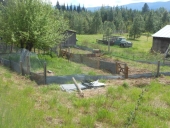




 2
2




Ollie Taylor wrote:my question is this - How did Paul get the initial interest into that hog meat? Was it billed as just organic meat, or as a 'You won't get sick!' meat? I could not find it mentioned how these people either were told/found out about this meat, and subsequently were happy to pay high prices for it, let alone that it would not cause them problems when eating.
 3
3









 I'll be having a look over your website after this post.
I'll be having a look over your website after this post.

















Kelly Smitherson wrote:I have a waiting list of people who are begging me to raise more pigs, I can not meet the demand, but out here, people beg for good food, I do not have to sell why organic non gmo pasture is better- they know and they want it- so I lucked out that way, we are close to bg urban areas, now.. my folks trying to sell organic pork in the ag belt in Wisconsin- that IS different marketing than I have to do out here in the shadow of Seattle, home of the foodies
no issues in finding the demand, it is more about sticking to my guns on how I want to raise my animals and not giving into greed and trying to actually meet that demand
finding a SMALL customer base of people who think the way I do, and support SMALL family farm - and not compromising my priorities to make a sale
when you actually start farming, you will be amazed at how many other farmes come out of the woodwork all around you, it may seem like no one else is out there, but once you start networking as a working farmer- they will appear. I thought NO ONE else was doing what I was doing in my county, once I put some skin in the game I suddenly saw I was one of many- how wonderful
 Thanks for sharing your experience Kelly, appreciate it so much.
Thanks for sharing your experience Kelly, appreciate it so much.
Renate Haeckler wrote:Just wanted to throw out there - to find the first few customers try craigslist farm/garden section and also www.localharvest.org. After a bit you'll get return customers and word-of-mouth customers.
We just bought a pig off of someone on craigslist while waiting for ours to get big enough to eat.
There's also a new butcher shop in the area that specializes in locally raised, hormone/antibiotic free meats. I think the way the owner is working it is you can sell the animal directly to him then take it to one of three butchers he uses and he pays you for the animal and pays the butcher for their fees. It's just a storefront with a bunch of chest freezers but the guy is personable and I think he's doing quite well. Maybe you could look around to see if there's anyone like that in your area.




















relevant ->Hardy Kiwi Kickstarter l YogaToday 2 week trial l Daring Drake Farm - NY
The farming village was above all a society of philosophers without a need for philosophy - Fukuoka

|
Stop it! You're embarassing me! And you are embarrassing this tiny ad!
Play Your Way to a Sustainable Lifestyle: Uncover Permaculture Principles with Each Card
https://gardener-gift.com/
|






